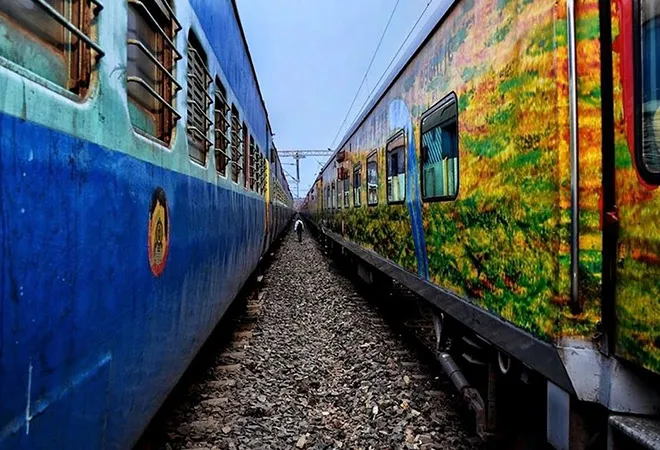-
CENTRES
Progammes & Centres
Location
Government should take suitable steps to improve the share of rail transport in both freight and passenger segments

Indian Railways rolled back, albeit partially, its much touted “flexi-pricing scheme” earlier this month. This should bring cheer to a vast multitude of rail travellers who were finding the flexi-fares a little too steep. However, the relief is expected to start trickling only after 120 days, a period for which rail tickets can be booked in advance. Let us take a look at the reason for introducing “flexi-pricing”, and also why it has not delivered the anticipated benefits.
Indian Railways’ passenger fare structure is one of the most unscientific entity, subjected to intense political whims and fancies. Consequently, the railways have been offering one of the lowest passenger fares in the world, and have been subsidizing these losses from high freight rates. As the rail coefficient in the overall freight basket nosedived below 30% by 2015-16, the finances of the railways started showing signs of distress. Subsequently in September 2016 the railways introduced “flexi-pricing” to shore up its passenger revenue.
The civil aviation sector, which has a number of private players, already had a mechanism of dynamic pricing. The airfare on various routes goes up and down, depending upon demand and supply. The “flexi-pricing” on the railways, on the other hand, only escalates. In a true demand-and-supply curve the equilibrium is achieved under market forces, whereas the railways’ flexi-pricing aims at a predetermined, bureaucratically derived, equilibrium point. This experiment, implemented on 142 trains out of around 2,000 mail and express trains running on the system daily has increased the earnings by only about ₹50 crore a month—an increase of a paltry 1.5% over the average monthly earnings of ₹3,600 crore from the non-suburban passenger segment.
Alternatively, an across-the-board “busy season surcharge” of say 15% for upper class, 10% for lower reserved class and 5% for unreserved class in all mail and express trains running daily, if implemented for six months in a year, could have raised more than ₹2,500 crore.
A more perturbing side-effect of this scheme was that many premium trains like Rajdhani and Shatabdi started reporting vacant berths/seats, even in periods when there always used to be waitlisting in all classes. The Comptroller and Auditor General of India recently flagged this issue by pointing out that these 145 trains carried 675,000 (according to Mint reports) fewer passengers post-flexi rates in comparison with a similar period of pre-flexi rates. Probably the algorithm used for this experiment of flexi-pricing was not dynamic enough to capture the nuances of passenger travel among all modes of travel. Transportation by its nature is a perishable commodity. Any wastage in this sector should be looked down upon, more so when government uses public finances to run a monopolistic monolith like Indian Railways.
There is a reasonable doubt that a large proportion of these missing passengers actually shifted to air travel, since the flexi rail fares sometimes climb even higher than the air fares on certain sectors. For journeys up to 500km, Volvo and other AC buses are now in competition with rail for the same reason. And this is not good for the country on holistic terms. On both environmental and social sustainability parameters, rail transport wins hands down when compared with other modes of transport. The government should take suitable steps to improve the share of rail transport in both freight and passenger segments.
With elections breathing down the neck, no hard decisions can be expected from the railway administration. Still, a well thought out scheme for raising passenger earnings without hurting the pockets of an average passenger and also maintaining a sense of fair play is the call of the day.
The views expressed above belong to the author(s). ORF research and analyses now available on Telegram! Click here to access our curated content — blogs, longforms and interviews.

Rgis Gourdel PhD candidate Institute for Ecological Economics Vienna University of Economics and Business
Read More +